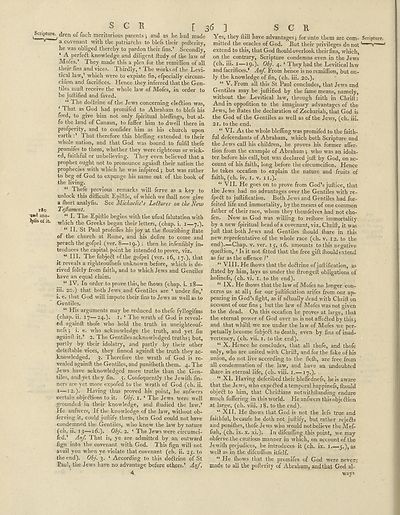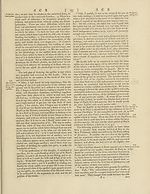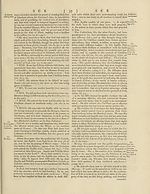Encyclopaedia Britannica, or, a Dictionary of arts, sciences, and miscellaneous literature : enlarged and improved. Illustrated with nearly six hundred engravings > Volume 19, Scripture-SUG
(42) Page 36
Download files
Complete book:
Individual page:
Thumbnail gallery: Grid view | List view

SCR [ •
.Scripture.^ (Jren 0f meritorious parents j and as lie had made
v a covenant ■with the patriarchs to blefs their pofterity,
he was obliged thereby to pardon their tins.’ Secondly,
‘ A perfect knowledge and diligent ftudy of the law of
Mofes.’ They made this a plea for the remiflion of all
their fins and vices. Thirdly, ‘ The works of the Levi-
tical law7,’ which were to expiate fin, efpecially circum-
cifion and facrifices. Hence they inferred that the Gen¬
tiles muft receive the whole law of Mofes, in order to
be juftified and faved.
“ 1 he dodtrine of the Jews concerning eleftion was,
‘ That as God had promifed to Abraham to blefs his
feed, to give him not only fpiritual bleflings, but al-
fo the land of Canaan, to fuffer him to dwell there in
profperity, and to confider him as his church upon
earth That therefore this bleffing extended to their
whole nation, and that God was bound to fulfil thefe
promifes to them, whether they were righteous or wick¬
ed, faithful or unbelieving. They even believed that a
prophet ought not to pronounce againft their nation the
prophecies with which he was infpired; but was rather
to beg of God to expunge his name out of the book of
the living.
“ Thefe previous remarks will ferve as a key to
unlock this difficult Epifile, of which we {hall now give
a fhort analyfis. See Michaelis's LeBures on the New
i to TeJ} ament.
^ “ T The Epiftle begins with the ufual falutation with
lylisoiit. which the Greeks began their letters, (chap. i. I—7.).
“ II. St Paul profeffes his joy at the flourifhing ftate
of the church at Rome, and his defire to come and
preach the gofpel (ver. 8—19.) : then he infenfibly in¬
troduces the capital point he intended to prove, viz.
“ III. The fubjedl of the gofpel (ver. 16, 17.), that
it reveals a righteoufnefs unknown before, which is de¬
rived folely from faith, and to which Jews and Gentiles
have an equal claim.
“ IV. In order to prove this, he (hows (chap. i. 18—
iii. 20.) that both Jews and Gentiles are ‘ under fin,’
i. e. that God will impute their fins to Jews as well as to
Gentiles.
“ His arguments may be reduced to thefe fyllogifms
(chap. ii. 17—24.). 1. ‘ The wrath of God is reveal¬
ed againft thofe who hold the truth in unrighteouf-
nefs ; i. e. who acknowledge the truth, and yet fin
againft it.r 2. The Gentiles acknowledged truths 5 but,
partly by their idolatry, and partly by their other
deteftable vices, they finned againft the truth they ac¬
knowledged. 3. Therefore the wrath of God is re¬
vealed againft the Gentiles, and punifheth them. 4. The
Jews have acknowledged more truths than the Gen¬
tiles, and yet they fin. 5. Confequently the Jewifli fin-
ners are yet more expofed to the wrath of God (ch. ii.
1—12.). Having thus proved his point, he anfwers
certain objeftions to it. 06/. 1. ‘ The Jews were well
grounded in their knowledge, and ftudied the law.’
He anfwers, If the knowledge of the law, without ob-
ferving it, could juftify them, then God could not have
condemned the Gentiles, who knew the law by nature
(ch. ii. 13—a6.). 06j. 2. 1 The Jews were circumci-
fed.’ An/. That is, ye are admitted by an outward
fign into the covenant with God. This fign will not
avail you when ye violate that covenant (ch. ii. 25. to
the end). Obj. 3. ‘ According to this doftrine of St
Paul, the Jews have no advantage before others.’ Anf.
4
6 ] SCR
Yes, they ftill have advantages j for unto them are com- Script!
mitted the oracles of God. But their privileges do not' ' V
extend to this, that God fhould overlook their fins, which,
on the contrary, Scripture condemns even in the Jews
(ch. iii. 1—19.). Obj. 4. ‘ They had the Leviticallaw
and facrifices.* Anf. From hence is no remiflion, but on¬
ly the knowledge of fin, (ch. iii. 20.).
“ V. From all this St Paul concludes, that Jews and
Gentiles may be juftified by the fame means, namely,
without the Levitical law, through faith in Chrift:
And in oppofition to the imaginary advantages of the
Jews, he ftates the declaration of Zechariah, that God is
the God of the Gentiles as well as of the Jews, (ch. iii.
21. to the end.
“ VI. As the whole blefling was promifed to the faith¬
ful defcendants of Abraham, which both Scripture and
the Jews call his children, he proves his former affer-
tion from the example of Abraham ; who was an idola¬
ter before his call, but was declared juft by God, on ac¬
count of his faith, long before the circumcifion. Hence
he takes occafion to explain the nature and fruits of
faith, (ch. iv. 1. v. 11.).
“ VII. He goes on to prove from God’s juftice, that
the Jews had no advantages over the Gentiles with re-
fpedt to juftification. Both Jews and Gentiles had for¬
feited life and immortality, by the means of one common
father of their race, whom they themfelves had not cho-
fen. Now as God was willing to reftore immortality
by a new fpiritual head of a covenant, viz. Chrift, it was
juft that both Jews and Gentiles fhould fhare in this
new reprefentative of the whole race (ch. v. 12. to the
end).—Chap. v. ver. 15, 16. amounts to this negative
queftion, ‘ Is it not fitted that the free gift fliouldextend
as far as the offence ?’
“ VIII. He fhows that the doflrine of juftification, as
ftated by him, lays us under the ftrongeft obligations of
holinefs, (ch. vi. 1. to the end).
“ IX. He fhows that the law of Mofes no longer con¬
cerns us at all; for our juftification arifes from our ap¬
pearing in God’s fight, as if actually dead with Chrift on
account of our fins ; but the law of Mofes was not given
to the dead. On this occafion he proves at large, that
the eternal power of God over us is not affefled by this;
and that whilft we are under the law of Mofes we per¬
petually become fubjeft to death, even by fins of inad¬
vertency, (ch. vii. 1. to the end).
“ X. Hence he concludes, that all thofe, and thofe
only, who are united with Chrift, and for the fake of his
union, do not live according to the flefh, are free from
all condemnation of the law, and have an undoubted
fhare in eternal life, (ch. viii. 1.—17.).
“ XI. Having defcribed their bleflednefs, heis aware
that the Jews, who expe&ed a temporal happinefs, fhould
objebt to him, that Chriftians notwithftanding endure
much fuffering in this world. He anfwers this objeftion
at large, (ch. viii. 18. to the end).
“ XII. He fhows that God is not the lefs true and
faithful, becaufe he doth not juftify, but rather rejedls
and punifhes, thofe Jews who would not believe the Mef-
fiah, (ch. ix. x. xi.). In difcufling this point, we may
obferve the cautious manner in which, on account of the
Jewifli prejudices, he introduces it (ch. ix. 1 5.), as
well as in the difcuflion itfelf.
“ He fhows that the promifes of God were never’;
made to all the pofterity of Abraham, and that God al¬
ways
.Scripture.^ (Jren 0f meritorious parents j and as lie had made
v a covenant ■with the patriarchs to blefs their pofterity,
he was obliged thereby to pardon their tins.’ Secondly,
‘ A perfect knowledge and diligent ftudy of the law of
Mofes.’ They made this a plea for the remiflion of all
their fins and vices. Thirdly, ‘ The works of the Levi-
tical law7,’ which were to expiate fin, efpecially circum-
cifion and facrifices. Hence they inferred that the Gen¬
tiles muft receive the whole law of Mofes, in order to
be juftified and faved.
“ 1 he dodtrine of the Jews concerning eleftion was,
‘ That as God had promifed to Abraham to blefs his
feed, to give him not only fpiritual bleflings, but al-
fo the land of Canaan, to fuffer him to dwell there in
profperity, and to confider him as his church upon
earth That therefore this bleffing extended to their
whole nation, and that God was bound to fulfil thefe
promifes to them, whether they were righteous or wick¬
ed, faithful or unbelieving. They even believed that a
prophet ought not to pronounce againft their nation the
prophecies with which he was infpired; but was rather
to beg of God to expunge his name out of the book of
the living.
“ Thefe previous remarks will ferve as a key to
unlock this difficult Epifile, of which we {hall now give
a fhort analyfis. See Michaelis's LeBures on the New
i to TeJ} ament.
^ “ T The Epiftle begins with the ufual falutation with
lylisoiit. which the Greeks began their letters, (chap. i. I—7.).
“ II. St Paul profeffes his joy at the flourifhing ftate
of the church at Rome, and his defire to come and
preach the gofpel (ver. 8—19.) : then he infenfibly in¬
troduces the capital point he intended to prove, viz.
“ III. The fubjedl of the gofpel (ver. 16, 17.), that
it reveals a righteoufnefs unknown before, which is de¬
rived folely from faith, and to which Jews and Gentiles
have an equal claim.
“ IV. In order to prove this, he (hows (chap. i. 18—
iii. 20.) that both Jews and Gentiles are ‘ under fin,’
i. e. that God will impute their fins to Jews as well as to
Gentiles.
“ His arguments may be reduced to thefe fyllogifms
(chap. ii. 17—24.). 1. ‘ The wrath of God is reveal¬
ed againft thofe who hold the truth in unrighteouf-
nefs ; i. e. who acknowledge the truth, and yet fin
againft it.r 2. The Gentiles acknowledged truths 5 but,
partly by their idolatry, and partly by their other
deteftable vices, they finned againft the truth they ac¬
knowledged. 3. Therefore the wrath of God is re¬
vealed againft the Gentiles, and punifheth them. 4. The
Jews have acknowledged more truths than the Gen¬
tiles, and yet they fin. 5. Confequently the Jewifli fin-
ners are yet more expofed to the wrath of God (ch. ii.
1—12.). Having thus proved his point, he anfwers
certain objeftions to it. 06/. 1. ‘ The Jews were well
grounded in their knowledge, and ftudied the law.’
He anfwers, If the knowledge of the law, without ob-
ferving it, could juftify them, then God could not have
condemned the Gentiles, who knew the law by nature
(ch. ii. 13—a6.). 06j. 2. 1 The Jews were circumci-
fed.’ An/. That is, ye are admitted by an outward
fign into the covenant with God. This fign will not
avail you when ye violate that covenant (ch. ii. 25. to
the end). Obj. 3. ‘ According to this doftrine of St
Paul, the Jews have no advantage before others.’ Anf.
4
6 ] SCR
Yes, they ftill have advantages j for unto them are com- Script!
mitted the oracles of God. But their privileges do not' ' V
extend to this, that God fhould overlook their fins, which,
on the contrary, Scripture condemns even in the Jews
(ch. iii. 1—19.). Obj. 4. ‘ They had the Leviticallaw
and facrifices.* Anf. From hence is no remiflion, but on¬
ly the knowledge of fin, (ch. iii. 20.).
“ V. From all this St Paul concludes, that Jews and
Gentiles may be juftified by the fame means, namely,
without the Levitical law, through faith in Chrift:
And in oppofition to the imaginary advantages of the
Jews, he ftates the declaration of Zechariah, that God is
the God of the Gentiles as well as of the Jews, (ch. iii.
21. to the end.
“ VI. As the whole blefling was promifed to the faith¬
ful defcendants of Abraham, which both Scripture and
the Jews call his children, he proves his former affer-
tion from the example of Abraham ; who was an idola¬
ter before his call, but was declared juft by God, on ac¬
count of his faith, long before the circumcifion. Hence
he takes occafion to explain the nature and fruits of
faith, (ch. iv. 1. v. 11.).
“ VII. He goes on to prove from God’s juftice, that
the Jews had no advantages over the Gentiles with re-
fpedt to juftification. Both Jews and Gentiles had for¬
feited life and immortality, by the means of one common
father of their race, whom they themfelves had not cho-
fen. Now as God was willing to reftore immortality
by a new fpiritual head of a covenant, viz. Chrift, it was
juft that both Jews and Gentiles fhould fhare in this
new reprefentative of the whole race (ch. v. 12. to the
end).—Chap. v. ver. 15, 16. amounts to this negative
queftion, ‘ Is it not fitted that the free gift fliouldextend
as far as the offence ?’
“ VIII. He fhows that the doflrine of juftification, as
ftated by him, lays us under the ftrongeft obligations of
holinefs, (ch. vi. 1. to the end).
“ IX. He fhows that the law of Mofes no longer con¬
cerns us at all; for our juftification arifes from our ap¬
pearing in God’s fight, as if actually dead with Chrift on
account of our fins ; but the law of Mofes was not given
to the dead. On this occafion he proves at large, that
the eternal power of God over us is not affefled by this;
and that whilft we are under the law of Mofes we per¬
petually become fubjeft to death, even by fins of inad¬
vertency, (ch. vii. 1. to the end).
“ X. Hence he concludes, that all thofe, and thofe
only, who are united with Chrift, and for the fake of his
union, do not live according to the flefh, are free from
all condemnation of the law, and have an undoubted
fhare in eternal life, (ch. viii. 1.—17.).
“ XI. Having defcribed their bleflednefs, heis aware
that the Jews, who expe&ed a temporal happinefs, fhould
objebt to him, that Chriftians notwithftanding endure
much fuffering in this world. He anfwers this objeftion
at large, (ch. viii. 18. to the end).
“ XII. He fhows that God is not the lefs true and
faithful, becaufe he doth not juftify, but rather rejedls
and punifhes, thofe Jews who would not believe the Mef-
fiah, (ch. ix. x. xi.). In difcufling this point, we may
obferve the cautious manner in which, on account of the
Jewifli prejudices, he introduces it (ch. ix. 1 5.), as
well as in the difcuflion itfelf.
“ He fhows that the promifes of God were never’;
made to all the pofterity of Abraham, and that God al¬
ways
Set display mode to:
![]() Universal Viewer |
Universal Viewer | ![]() Mirador |
Large image | Transcription
Mirador |
Large image | Transcription
Images and transcriptions on this page, including medium image downloads, may be used under the Creative Commons Attribution 4.0 International Licence unless otherwise stated. ![]()
| Permanent URL | https://digital.nls.uk/192695828 |
|---|
| Attribution and copyright: |
|
|---|
| Description | Ten editions of 'Encyclopaedia Britannica', issued from 1768-1903, in 231 volumes. Originally issued in 100 weekly parts (3 volumes) between 1768 and 1771 by publishers: Colin Macfarquhar and Andrew Bell (Edinburgh); editor: William Smellie: engraver: Andrew Bell. Expanded editions in the 19th century featured more volumes and contributions from leading experts in their fields. Managed and published in Edinburgh up to the 9th edition (25 volumes, from 1875-1889); the 10th edition (1902-1903) re-issued the 9th edition, with 11 supplementary volumes. |
|---|---|
| Additional NLS resources: |
|

